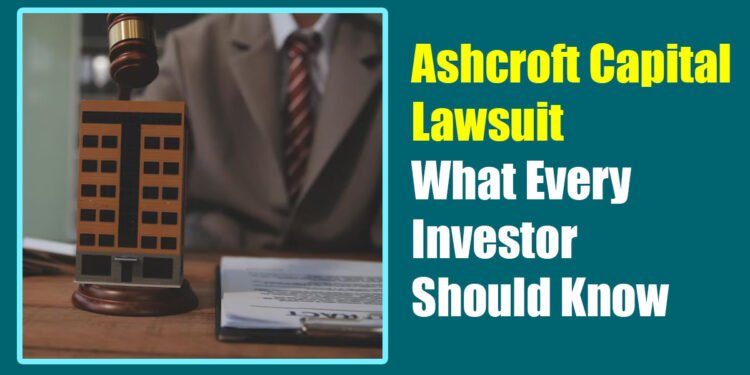When a trusted sponsor faces serious legal challenges, it becomes a moment of reckoning not just for one firm, but for the entire syndication industry. The Ashcroft Capital lawsuit is exactly that kind of turning point. Whether you’re invested already or simply following the headlines, this article cuts through the noise to offer clarity, context, and practical advice.
Summary
| Category | Details |
|---|---|
| Company Name | Ashcroft Capital |
| Founded | Founded by Joe Fairless and partners |
| Business Model | Multifamily real estate syndications |
| Investor Type | Accredited (passive) real estate investors |
| Legal Case | Cautero v. Ashcroft Legacy Funds, LLC (2025) |
| Allegations | Misrepresentation, lack of disclosure, fiduciary breach |
| Disputed Amount | $18+ million in claimed damages |
| Status (2025) | Ongoing – in discovery phase |
Setting the Stage
From polished webinars to slick pitch decks, Ashcroft Capital has long held a strong reputation in multifamily syndications. But in February 2025, a group of 12 accredited investors filed Cautero v. Ashcroft Legacy Funds, LLC in the U.S. District Court for New Jersey, alleging more than $18 million in damages tied to what they say were inflated return projections, insufficient disclosures, and misaligned fees.
This lawsuit isn’t just about one firm’s practices it challenges the very foundations of trust and transparency in private real estate investments. So let’s break down what the Ashcroft Capital lawsuit is, why it matters, and what it reveals about the world of syndications.
What Is the Is Ashcroft Capital?
Before diving deeper, it’s essential to understand what Ashcroft Capital represents. Founded by industry veterans and well-known in syndication circles, the firm offers passive investors access to value-add multifamily properties across U.S. metros. Their official messaging emphasizes capital preservation, trust, and risk-adjusted returns.
Over the years, they built a strong brand as a sponsor with institutional policies, in-house asset management, and communication channels. That reputation is one of the reasons this lawsuit has rippled across investor communities.
Key Allegations ihese claims form the basis of allegations that go beyond just poor performance they suggest breach of fiduciary duty, negligent misrepresentation, and potential securities violations.

Where Things Stand Now
As of mid-2025, the lawsuit is in the discovery phase. Ashcroft’s legal team has filed motions to partially dismiss particularly around the federal securities claims citing risk disclosures in offering documents and volatile market conditions as defense.
Court documents show the production of some internal financials and communications, though investors have expressed concerns over partial disclosures and delays. A former Ashcroft employee has reportedly submitted an affidavit claiming internal pressure to inflate IRRs in investor materials.
With mediation talks apparently scheduled for late 2025 and depositions on the horizon, the case has become a high-profile bellwether not just for Ashcroft, but for the broader syndication model.
Why the Ashcroft Capital Lawsuit Matters
- Investor Trust Is Fragile
Syndications rely deeply on sponsor credibility. When trust erodes even through one firm it sends ripples of doubt across the entire model. - Transparency Standards Are in Question
Deals once driven by compelling returns are now judged by how clearly they reveal risk, debt exposure, and fee allocation. - Legal and Regulatory Pressure Could Grow
The SEC watches any Reg D offering involving tens of millions of investor dollars. This case may prompt greater scrutiny, third-party audits, or new requirements for private syndications. - The Industry Must Evolve
Sponsoring groups, platforms, and advisors are likely to reassess underwriting standards, communication protocols, and governance structures aiming to raise the bar on accountability.
What Investors Can and Should Do Now
- Review Your Documents: Go back through your Private Placement Memoranda, subscription agreements, and investor letters. Compare projections to actual returns and ask for explanations where gaps exist.
- Seek Legal Counsel: If you’re part of an Ashcroft fund, or if your investments have seen poor outcomes, consult a real estate or securities attorney to evaluate your rights and options.
- Monitor Progress Carefully: Track formal court filings, discovery updates, and statements from Ashcroft. Avoid making decisions based on hearsay or forum chatter alone.
- Talk with Peers: Honest investor communities on Reddit, BiggerPockets, or private groups can offer insights, but always treat them as anecdotal unless backed by documents or filings.
- Reevaluate Risk: Consider diversifying your syndication exposure. If one sponsor made missteps, having bets across multiple operators can provide protection.
Conclusion
The Ashcroft Capital lawsuit goes beyond its headlines. It questions how syndications are marketed, disclosed, and managed and what safeguards truly exist for investors. Filed in February 2025, the case alleges over $18 million in damages tied to misrepresentation and breach of fiduciary duty. But the deeper issue it raises is about trust and legal accountability in the syndication space. As discovery progresses and mediation looms, many in the industry are watching closely. Whether you’re an investor in Ashcroft or not, this case delivers a clear message: transparency isn’t optional, and verification is essential. As outcomes unfold, expectations around sponsor behavior, reporting, and risk management will likely evolve for the better.
FAQs
What triggered the Ashcroft Capital lawsuit?
A group of accredited investors filed a lawsuit in February 2025, alleging that Ashcroft Capital misrepresented investment returns, failed to disclose key financial risks, and breached fiduciary responsibilities.
How much money is involved in the lawsuit?
The plaintiffs are seeking over $18 million in damages, tied to multiple multifamily syndication deals they claim underperformed due to sponsor mismanagement and misleading forecasts.
Has Ashcroft Capital responded to the allegations?
Yes, Ashcroft has denied wrongdoing, stating that market volatility not misconduct is responsible for performance issues. They cite full risk disclosures in offering documents as part of their defense.
Is the case resolved yet?
As of mid-2025, the lawsuit is still in the discovery phase, with court proceedings and potential mediation scheduled. A final ruling or settlement has not yet been reached.
What does this mean for other real estate investors?
The case highlights the need for stronger due diligence, better sponsor transparency, and realistic return expectations. It may influence industry standards and regulatory practices moving forward.










